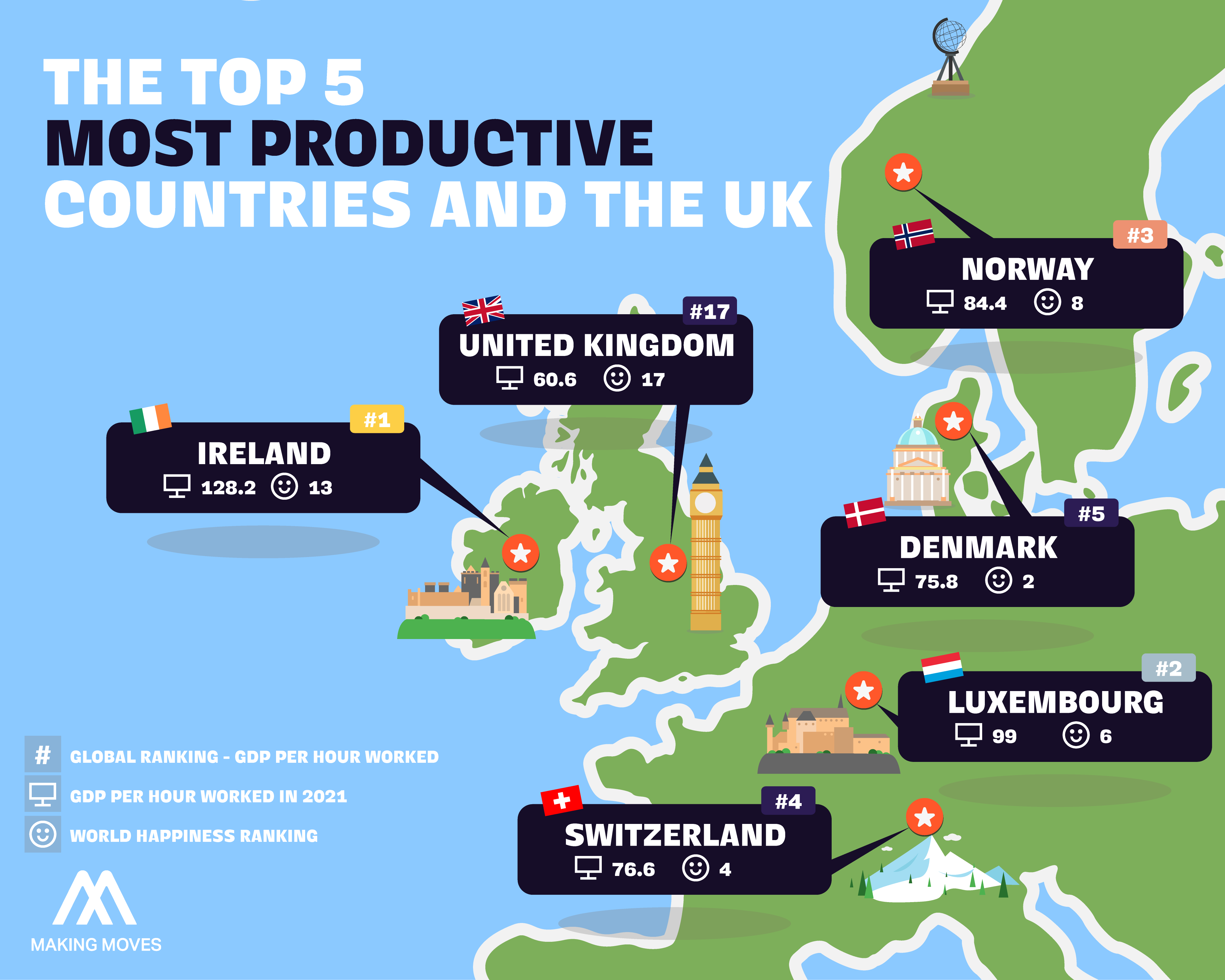We know that some countries are more productive than others, but what exactly is it that makes them such much more efficient? And is there anything we can learn from them? To find out, we’ve analysed the top five most productive countries, their business outlook, working conditions, and global happiness compared to the UK, with some surprising results.
We compared data from the UK with the top five most productive countries to determine what makes somewhere more productive. Our data included:
– GDP per hour worked
– Biggest contributor to output
– Distribution of DPR in largest industry
– Main industry employer
– Top SIC code
– Industry with the most companies registered
– Top company by number of employees
– Top company by sales
– Typical working hours per week
– Holiday entitlement (days)
– Average pay
– Cost of living
– Happiness score
– Happiness ranking
The full dataset can be found here.
So, what makes the most productive countries so productive?
Happy workers are better workers
It should come as no surprise that happy workers are more efficient, but our data has highlighted just how much it could contribute to a nation’s productivity levels. Four out of our top five most productive countries are ranking in the top 10 in the World Happiness Report. These are Luxembourg, Norway, Switzerland, and Denmark, the second, third, fourth, and fifth most productive countries in the world.
So, what does this mean for the workplace? Employee happiness isn’t just great for your team but can also make your company more efficient. The ability to make life choices and a good social support network were among some of the factors used in the World Happiness Report, and this can help guide employers when implementing various workplace perks. For example, offering a more flexible working policy can help give your people a better work/life balance.
Making sure your company is positive and transparent can greatly improve your team’s support network too. Encourage communication and listen to employee concerns. Not only will this help everyone feel like they have control over their environment, but they’ll know they have someone who will listen and support them if they have anything to discuss.
Tech and manufacturing lead the way
While the services sector is responsible for the majority of GDP in all the productive countries, as well as the UK, there is a difference in the biggest and most profitable industries. Technology seems to lead the productivity race. In Ireland, the most productive country, the biggest and most profitable companies are both technology companies.
The tech industry is paving the way for other industries, too. Technology is vastly transforming every other sector out there. So much so, that by 2023, digitally transformed enterprises are expected to account for more than half of the overall nominal GDP (Statista).
Manufacturing also seems to be another key contributor to productivity levels on a national level. In Luxembourg, the second most productive country, steel manufacturing company ArcelorMittal is both the largest and most profitable company across the nation.
Salary beats holidays
We all look forward to our holidays, so you’d be forgiven for thinking that holidays may contribute to happiness levels and productivity. However, our index has revealed that this isn’t the case. There doesn’t seem to be any correlation between happiness levels and holiday entitlement, as our index shows that the countries with the most holiday entitlement tend to work longer hours each week.
It’s average pay that seems to be the biggest factor when it comes to working conditions and productivity. The countries with higher average pay were also the most productive, showing that higher salaries seem to be more conducive to productivity over working hours and holiday allowance.
What’s so different about Ireland?
After everything we’ve said, you might be wondering “but what about Ireland?” It’s the most productive country according to OECD data, with a whopping 128.2 GDP per hour worked in 2021. But it also has a low average pay, a lower happiness ranking, and high working hours per week. So, why is it so productive?
Ireland’s productivity could largely be attributed to the number of multinational corporations based in the country. Most notably, Google is one of the most profitable companies in Ireland. Alphabet, the parent company of Google, is one of the largest companies in the world, according to the Forbes 2000 list.
Google is known for providing a positive workspace and employee benefits. This includes hybrid working, medical insurance, and mental health assistance programmes, among many others, all of which can contribute to productivity.
There’s also Google’s famous office spaces to consider. The company describes their offices as “inspiring spaces to work, recharge, and collaborate with fellow Googlers”, and having a great place to work can help boost motivation. Offering various zones for different types of work, such as meeting spaces, collaboration areas, and quiet nooks for focus time can help everyone to deliver their best work. A well-decorated space can also improve mood more generally, increasing productivity even more.
Making Moves CEO, Tobi Crosbie, said of the results:
“Interesting to see what kinds of factors can contribute to productivity and how these can change throughout the world. While we knew aspects like happiness can influence productivity levels, we now have the data to show just how big an impact it can have.
“The index is a great resource for employers to better learn how they can provide for their team. We can see how a good working environment can affect motivation and productivity levels, so making your company a positive place to be should be of utmost importance to business owners.
“The easiest and best way to see exactly what kinds of perks and improvements your employees want is by asking them. Sending out anonymous company surveys is a great way of collecting honest feedback, so you can implement benefits that aren’t just performative or surface-level, but actually mean something to your team. In turn, you may just get a productivity boost.”
With the UK ranking 17th for productivity, there’s definitely something we can learn from the most productive countries. Our index offers just a small insight into what makes people more productive, and companies can use it to manage their processes. Our ultimate productivity guide offers plenty of tips and tricks for boosting productivity in the workplace, from productivity trends to advice for employers, so be sure to give it a read.
🚚 Source, negotiate and manage entire office moves.
🏢 Dispose, sublet or redesign your office.
🖊️ Professional, independent support.




